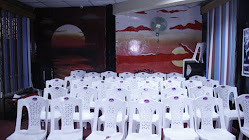Countering Terrorists’ Use of The Internet
POSTED BY MICHAEL ORTIZ
JANUARY 12, 2017
A man uses a computer at a
computer shop in central London
Over the last several months, I traveled to Africa, Europe, the
Middle East, and Silicon Valley to discuss our efforts to prevent and counter
violent extremism (CVE) with government officials, civil society, and the
private sector. We discussed issues such as enhancing our collective
understanding of the drivers of violent extremism (yes, they’re different in
each neighborhood), developing new tools, and effectively organizing
governments, civil society organizations, and the private sector to take on
this challenge. In each village, city, and country I visited, I also met
with teenagers and university students, teachers and parents, tech experts, and
cybersecurity experts. One question consistently came up in every
conversation: How can we counter violent extremism online?
Many also wondered what does it mean to counter violent extremism
online, exactly? It means countering the use of the Internet to radicalize and
recruit individuals to violence. In other words, we are focused on stopping
terrorist groups, like ISIL, al-Qa’ida, and al-Shabaab, among others, from
exploiting social media and online communication platforms to inspire young
people to travel to Syria, Iraq, and other places – including within their own
countries -- to help these terrorist groups commit acts of violence.
Terrorists’ actions can include developing and promoting terrorist
messaging online or engaging with individuals one-on-one to entice them to
violence. Terrorists aim to exploit the vulnerabilities of the young people
they target, then isolate them, and finally offer incentives to travel to war
zones or commit violence. Often times, siblings, friends, and parents are
unaware their loved one is being enticed to travel across the world, likely
never to return. If they do return, the experience will change their lives
forever in terrible ways.
Countering terrorists’ use of online communication platforms is
complicated. It involves multiple legal systems, freedom of speech protections,
tech companies’ terms of service agreements, law enforcement, human rights, international
agreements, and family relationships. What is clear is that the solution
requires a whole-of-society approach to include governments, tech experts,
parents, and community leaders, among others.
Over the last year, tech companies have removed more and more
terrorist content that violates their terms of service agreements. The Global
Coalition to Counter-ISIL’s Communications Working Group (led by the United
States, the United Arab Emirates, and the United Kingdom) regularly convenes
over 30 member countries with media and tech companies to share information and
strategies to counter violent extremist messages online and present positive
alternative narratives. These are all steps in the right direction.
At the State Department, we’ve created new programs and
initiatives to address this growing threat. We have also applauded governments
and tech companies for taking actions to counter violent extremism online, and
supported third-party, credible messengers through various training programs.
Tech camps and media workshops, “Voices of Reason” public-private networking
events in Istanbul and Tunis, and the Creative Minds for Social Good
partnership between the Department of State, the Sawab Center, and Facebook in
Dubai have all helped sharpen voices to counter the messages from terrorists.
We also work closely with the Global Engagement Center, the interagency entity
that is applying data-driven solutions to counter-messaging.
I’ve been involved in a number of key programs, which are really
moving the ball forward. These include the Peer to Peer (P2P) Challenging
Extremism program, which empowers university students around the world to push
back directly on terrorist messaging by developing and launching their own
messaging campaigns. These campaigns are developed by young people for young
people. The State Department also supported a new “Hacking for Diplomacy”
course at Stanford University, which encouraged students to think creatively
about global issues, including countering violent extremism, and develop
innovative and technological solutions.
In addition to these approaches, we also need to educate leaders
in all arenas on how they can tackle terrorists’ use of the internet to recruit
vulnerable citizens. Whether it’s figuring how to help someone who is being
radicalized, or figuring out what questions to ask if a parent suspects a son
or daughter is messaging with a recruiter-- communities around the world need
support. When I travel, I regularly ask national and local government leaders
and civil society groups about the resources they’re offering communities --
and whether or not families know where to turn if they suspect radicalization?
How are they educating parents who do not use the Internet themselves but whose
children do? Governments and civil society groups are thinking more and more
about these issues, and we must support them.
We also need to make sure our actions aren’t making the problem
worse. Let me give you a few examples. First, in some countries, the only
resource for parents to turn to if they suspect a child is becoming radicalized
is the police. Many times families are not comfortable turning their loved one
in to law enforcement unless they believe violence is imminent. Second, when
some governments see violent extremist messaging and recruitment material
proliferating online, their first reaction is to take down accounts or sites --
or in more extreme cases, shut down the internet altogether. While this may
temporarily limit terrorists’ online activities, it also can have a significant
negative impact on positive uses of the internet, and may result in individuals
becoming more frustrated with government institutions. We need to take great
care as we proceed.
It is clear, countering violent extremism online remains a complex
challenge. Addressing it will require governments, private companies, civil
society organizations, schools, and communities to work together to make
progress on making the internet safer for all.
About the Author: Michael R. Ortiz is the Deputy
Coordinator of Countering Violent Extremism in the Bureau of Counterterrorism and Countering Violent
Extremism at the U.S. Department of State.
Subscribe to:
Post Comments
(
Atom
)


















No comments :
Post a Comment